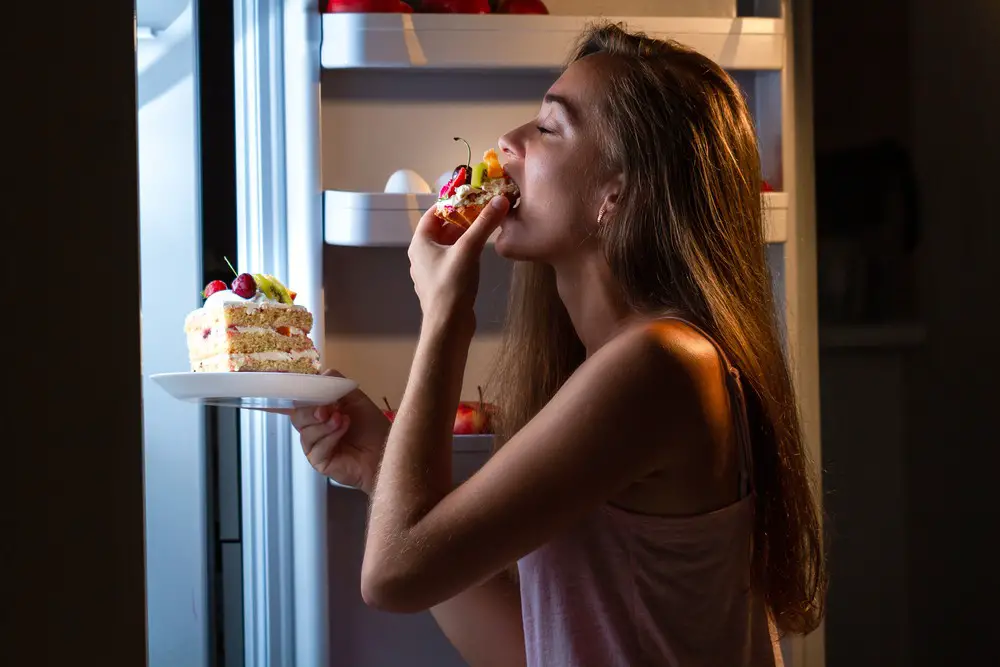As a BetterHelp affiliate, we receive compensation from BetterHelp if you purchase products or services through the links provided
Do you find yourself tossing and turning all night long? Are you plagued by restless nights where you feel like you can’t get comfortable no matter what you do? If so, it’s possible that your eating habits are to blame. Believe it or not, the time at which you eat can have a significant impact on your sleep quality. In this article, we will explore the relationship between food and sleep and answer the question: how long should you wait before sleeping after eating?
The Complex Relationship Between Sleep and Food
There is no one-size-fits-all answer to this question. The complex relationship between sleep and food means that the ideal time to wait before sleeping after eating will vary from person to person. However, general guidelines can help determine how long to wait before hitting the hay.
As a general rule, it is best to avoid eating large meals in the hours leading up to bedtime. Digesting food takes energy, leaving you feeling uncomfortable or bloated. If you must eat close to bedtime, opt for a light snack instead of a full meal.

In addition, certain foods can have an impact on your sleep quality. For example, caffeine is a stimulant that can keep you awake, while alcohol can make you feel drowsy. Therefore, it is essential to be mindful of what you are eating and drinking in the hours before bed.
Foods To Avoid Before Going To Bed
As we mentioned above, certain foods can have an impact on your sleep. When you take a large meal at night, the result is weight gain. It also leads to gastroesophageal reflux disease (GERD) symptoms, such as a bitter taste in your mouth. If you are looking to get a good night’s rest, it is best to avoid the following foods and drinks in the hours leading up to bedtime:
Alcohol:
Alcohol is a depressant, which can make you feel drowsy. However, it can also disrupt your sleep patterns and lead to insomnia.
Heavy Foods:
Heavy foods take longer to digest and can make you uncomfortable or bloated.
High Water Content Foods:
High water content foods (such as watermelon) can cause you to wake up in the middle of the night to use the restroom.
Spicy Foods:
Spicy foods can cause heartburn or indigestion, making it difficult to fall asleep.
Acidic Foods:
Acidic foods (such as citrus fruits) can trigger heartburn or acid reflux.
Caffeine:
Caffeine is a stimulant that can keep you awake and disrupt your sleep patterns.
Sugary Treats:
Sugary treats can give you a temporary energy boost but can also lead to a sugar crash that can make it difficult to fall asleep.

What Should You Eat Before Bed?
Well, that depends on your individual preferences and needs. However, a few general tips can help you make the best choices for a good night’s sleep. For example, complex carbohydrates can promote drowsiness by raising your blood sugar levels. Therefore, foods like whole-grain bread or oatmeal may help promote sleep. In addition, foods that contain tryptophan, such as turkey or milk, can also help you fall asleep by increasing levels of the hormone serotonin.
When it comes to drinks, warm milk is often cited as a helpful sleep aid. This is because milk contains both tryptophan and calcium, promoting relaxation and drowsiness. However, if you are lactose intolerant or simply don’t like the taste of milk, there are other options available. Herbal teas such as chamomile or lavender tea can also promote relaxation and may help you fall asleep.
How Long Should You Wait Before Sleeping After Eating?
The answer will vary depending on the individual. However, as a general rule, it is best to avoid eating large meals in the hours leading up to bedtime. If you must eat close to bedtime, opt for a light snack instead of a full meal. In addition, be mindful of what you are eating and drinking in the hours before bed, as certain foods and drinks (such as caffeine or alcohol) can impact your sleep quality. By following these tips, you can help ensure that you get a good night’s rest.
Recommended Timing For Eating And Sleeping
As we mentioned above, it is best to avoid eating large meals in the hours leading up to bedtime. If you must eat close to bedtime, opt for a light snack instead of a full meal. In addition, be mindful of what you are eating and drinking in the hours before bed, as certain foods and drinks (such as caffeine or alcohol) can impact your sleep quality.
The ideal situation would be to have your last meal of the day at least three hours before going to sleep. This gives your body enough time to digest food and avoid feeling bloated or uncomfortable when trying to fall asleep. In addition, it is essential to stay hydrated throughout the day; however, it is best to avoid drinking too much water in the hours leading up to bedtime, as this can cause you to wake up in the middle of the night to use the restroom.

Sleep Hygiene Habits
There are a few key things you can do to promote better sleep. First, establish regular sleep and wake times. This will help train your body to fall asleep and consistently wake up. Second, create a relaxing bedtime routine that includes winding down for 30 minutes before going to sleep. This may include reading, taking a bath, or listening to calm music. Third, avoid watching television or working on the computer in bed; reserve your bed for sleep and sex only. Finally, create a sleep-friendly environment in your bedroom by ensuring that it is dark, quiet, and cool.
In Conclusion
If you want to lose weight, your caloric intake must be less than your caloric expenditure. Getting a good night’s sleep is essential for your overall health and well-being. Following the tips above can help ensure you get a restful night’s sleep.
Article You Might Enjoy Reading
7 Uncommon Tactics People Use to Reduce Stress and Anxiety
Moon Juice – Magnesi-Om – Magnesium Powder Supplement Review
RENPHO Eye Massager with Bluetooth Music Review
Do Sleep Masks Work
Best Memory Foam Pillow – Complete Reviews with Comparison
- Left Arm Pain and Anxiety: Understanding the Relationship - November 23, 2023
- Anxiety Paralysis: Coping with Overwhelming Stress - November 23, 2023
- Anxious vs. Nervous: Differentiating Emotions and Responses - November 15, 2023
This site contains affiliate links to products. We will receive a commission for purchases made through these links.



